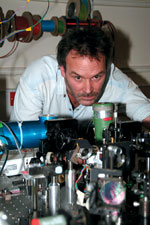
An optical effect created in a London laboratory suggests that solid, normally opaque objects such as walls, could one day be rendered transparent. Researchers from Imperial College London (ICL) and the University of Neuchâtel in Switzerland, have pioneered the technique that could eventually be used to see through rubble at earthquake sites, or look at parts of the body obscured by bone in normal X-ray images.
The effect is based on the development of a new material that exploits the way that atoms move, to make them interact with a laser beam in an entirely novel way. The Anglo-Swiss research project is based on a breakthrough that contradicts a former widely accepted theory proposed by Einstein that in order for a laser to work, the light-amplifying material it employs - usually a crystal or glass - must be brought to a state known as 'population inversion'.
This refers to the condition of the atoms within the material that must be excited with enough energy to make them 'emit' rather than 'absorb' light. A population inversion occurs when there are more atoms with a higher state of excitation than in lower energy states.
Quantum physicists have long predicted that by interfering with the wave-patterns created by vibrating electrons within atoms, light could be amplified without the need for population inversion to occur. This has previously been demonstrated in the atoms of gases, but until the laboratory experiment at ICL, it had not been shown to be possible in solids.
In order to make their breakthrough, researchers created specially patterned crystals only a few billionths of a metre in length that behave as 'artificial atoms'. When light is shone into these crystals, it becomes entangled with them at a molecular level rather than being absorbed, resulting in the material becoming transparent. In effect, a new, transparent material is created by such entanglement and which is made up of molecules that are half matter and half light. This allows light to be amplified without population inversion for the first time in a solid.
Professor Chris Phillips at ICL explained, "This real 'X-ray specs' effect relies on a property of matter that is usually ignored - the electrons it contains move in a wave-like way. What we have learned is how to control these waves directly. The results can be pretty weird at times but it is very exciting and so fundamental. At the moment the effect can only be produced in a lab under specific conditions but it has the potential to lead to all sorts of new applications."

The team also discovered that as light passes through this new material, it slows down dramatically, leading to the belief it could potentially be completely stopped and stored. Professor Phillips believes this discovery has important implications for the creation of a type of entirely secure information network.
"When we transmit information, for example by sending light pulses down optical fibres, it can normally only be accessed by making a form of measurement, and these measurements always disturb the information itself," he explains. "This technology offers us a means of sending light signals through a network without us having to disturb them. Now, if confidential information is being spied on, the disturbance shows up straight away and we can catch the eavesdropper with 100% certainty."
The scientists originally reported their findings in the Nature Materials journal. They once again underline the UK's strong science and technology base, with many universities and scientific institutions taking part in ground-breaking international collaborative projects such as this.
For more information contact Ade Onitolo, British High Commission, +27 (0)12 421 7563, [email protected]

© Technews Publishing (Pty) Ltd | All Rights Reserved